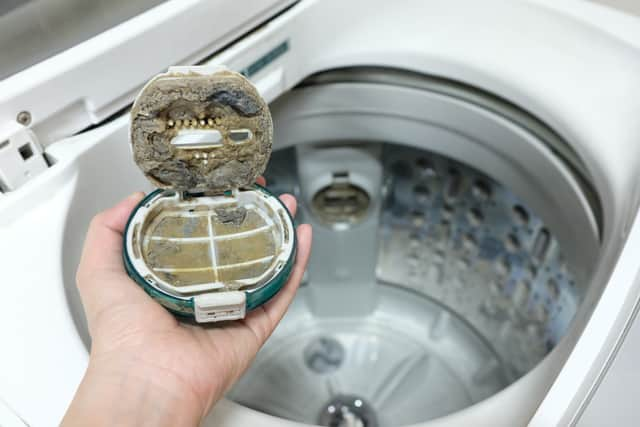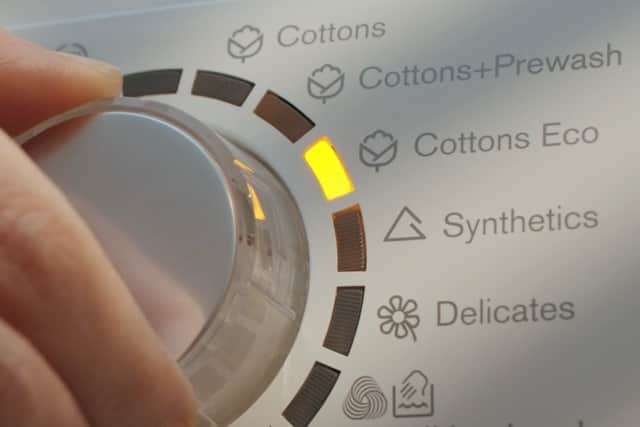How UK householders can save money and resources on home appliances


A new YouGov survey of 2,467 respondents underlined that people are keen to save energy to help achieve Net Zero and reduce their carbon footprint, with more than two thirds (68 per cent) saying they would do this – even if energy prices went down.
But four in 10 have made no changes to the way they used their appliances to save money since September last year, when electricity prices hit an all-time high.
Advertisement
Hide AdAdvertisement
Hide AdWhile nearly six in 10 (57 per cent) have found adopting ways to save money and energy in the use of home appliances to be successful.
The advice from the Association of Manufacturers of Domestic Appliances (AMDEA) comes amid the ongoing cost-of-living crisis, and with a typical dual-fuel household bill set to be just under £2,000 for the next three months.
As the clocks go back and nights draw in, their award-winning Know Watt’s What website is explaining how people are short-changing themselves by hundreds of pounds by sticking to old domestic routines.
However, by adopting small changes in their habits, householders can save money while also fulfilling their aspiration to contribute to Net Zero and reduce their carbon footprint – as other small maintenance tasks, such as descaling the kettle, can help maintain efficiency and extend appliance lifespan.
Advertisement
Hide AdAdvertisement
Hide Ad

Small changes make a big difference
For example, £80 can be saved each year by always washing clothes and dishes on the eco-cycle, while £60 can be saved by cooking food in the microwave rather than the oven.
Taken together, this conserves almost enough electricity to power a washing machine on eco-mode for two whole years.
The new campaign follows the recommendations of an in-home study conducted in seven homes over three months by the UKRI CE-Hub, University of Exeter Business School.
The study found that explaining why behaviour changes resulted in savings prompted participants to adopt an average of 22 distinct habits - once they understood why the changes made a difference.
Advertisement
Hide AdAdvertisement
Hide AdProfessor Fiona Charnley from the University of Exeter said: “Our research shows that people often stick to the same behaviours and are unclear of how they can make a difference.
“The study gave participants the chance to learn about small changes they can make to their daily routines and the impact they can have on extending the life of their appliances and reducing their household bills.
“We found that once they were provided with the evidence, they were quick to change their behaviour.”
Treat your appliances right
The YouGov results also found only 53 per cent of respondents who made changes over the past year had used the eco-setting on their washing machine – and 32 per cent on their dishwasher.
Advertisement
Hide AdAdvertisement
Hide AdWhen asked if they’ve given their household appliances a little TLC, only 24 per cent confessed they’ve never ran a service wash on their washing machine, while 18 per cent have never cleaned its filter.
Two in 10 admitted they’ve never descaled their appliances that have come into contact with water.
And 17 per cent say they’ve never defrosted the fridge and cleaned the door seals.
Cleaning lime-scale from appliances like washing and coffee machines, kettles and irons could save a possible £600 on replacements, as the build-up on heating elements can reduce efficiency and lifespan.
Advertisement
Hide AdAdvertisement
Hide AdWhile a possible £100 could be saved by paying heed to your appliances – whereas ignoring things like a knock or rattle from your machine can develop into more costly problem.
It also emerged that a further £100 can be put back into homeowners’ pockets by running a heat pump dryer instead of a condenser tumbler, as the technology can reduce drying costs by a third or more.
Choosing ‘C’ over ‘F’ rating when replacing a fridge could save £40 due to higher-rated fridges using less electricity every year of their lives.
And a £70 bill could be avoided by replacing fridge freezers over 15-years-old, as modern fridges have been found to be more energy efficient.
Advertisement
Hide AdAdvertisement
Hide AdAMDEA CEO Paul Hide added: “Many people don’t really treat their appliances as they might.
“Once fitted, the appliances are often forgotten about, regarded as self-supporting. But they are machines that benefit from small acts of care.
“So, by thinking about how appliances are used and giving them a little attention, households can save themselves money by using less energy and extending the lifespan of valuable assets.
“Why not stick a note on a washing machine to always use eco-mode or have a quarterly descale schedule? These are not grand life changes: a minimal effort can save a lot – and help the environment.”
The four routes to save money - according to AMDEA's Know Watt's What website:
- Use to save - use installed tech, such as eco-mode on washing appliances or small cooking appliances such as microwaves to cook smaller quantities.
- Maintain to save - look after machines to prolong efficient performance and lifespan.
- Repair to save - consider repairs before replacement.
- Replace to save - replace wisely by buying appliances that are the highest affordable on the rating scale and consider replacing fridges and freezers over 15 years old.
To find out more useful information, visit the website here.
Comment Guidelines
National World encourages reader discussion on our stories. User feedback, insights and back-and-forth exchanges add a rich layer of context to reporting. Please review our Community Guidelines before commenting.